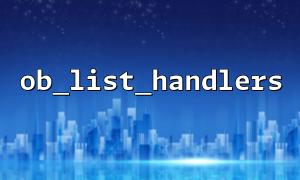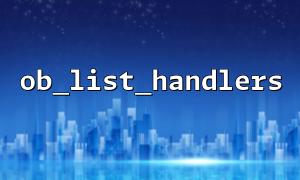In PHP, the ob_list_handlers function allows you to view the currently enabled output buffer handler. Output Buffering is a feature in PHP that allows you to temporarily store script output in memory rather than send it to the browser immediately. This way, you can process or modify the output and operate on it before it is finally sent to the browser.
This article will explain how to use the ob_list_handlers function to view and manage multiple cache handlers in PHP.
The ob_list_handlers function is used to list the currently active output buffer handler. Output buffer handlers are functions set when ob_start() is called and they are executed when the buffer is closed.
ob_list_handlers(): array
This function returns an array containing all registered output buffer handler names.
First, let's look at a simple example showing how to use ob_list_handlers to view all output buffering handlers currently enabled.
<?php
// Start output buffering
ob_start(function($buffer) {
// At the end of the output buffer,Modify the output content
return strtoupper($buffer);
});
// Output some content
echo "Hello, World!";
// use ob_list_handlers View all output buffer handlers
$handlers = ob_list_handlers();
// List of output handlers
print_r($handlers);
?>
Array
(
[0] => default output handler
[1] => user-defined callback handler
)
In this example, we first start a buffer using ob_start and specify a callback function that converts all output to uppercase. Next, we call ob_list_handlers to view all currently registered buffer handlers. The final output shows the default handler and our custom callback function.
If you no longer need an output buffer handler, you can use ob_end_flush or ob_end_clean to close the current buffer.
ob_end_flush() will output the contents in the buffer to the browser and close the buffer.
ob_end_clean() discards the contents in the buffer and closes the buffer.
For example, suppose we have multiple buffers started and want to close the first buffer:
<?php
// Start the first buffer
ob_start(function($buffer) {
return strtoupper($buffer);
});
// Start the second buffer
ob_start(function($buffer) {
return strrev($buffer);
});
// Output some content
echo "Hello, World!";
// use ob_list_handlers View all output buffer handlers
$handlers = ob_list_handlers();
print_r($handlers);
// Close the first buffer and output the result
ob_end_flush(); // This will output "HELLO, WORLD!"
// use ob_list_handlers Check the buffer handler again
$handlers = ob_list_handlers();
print_r($handlers);
?>
Array
(
[0] => user-defined callback handler
[1] => user-defined callback handler
)
HELLO, WORLD!
Array
(
[0] => user-defined callback handler
)
In this example, we start two buffers first. By calling ob_end_flush(), the first buffer is closed and the content is output, and the result shows that the second buffer is still active.
If you want to delete all buffers and clear the buffer contents, you can use ob_clean() and ob_end_clean() to clean all buffers without outputting.
<?php
// Start the buffer
ob_start();
echo "Hello, World!";
// Delete all buffers
while (ob_get_level()) {
ob_end_clean();
}
// Output the current buffer list
$handlers = ob_list_handlers();
print_r($handlers); // Empty arrays should be displayed
?>
In this example, all buffers are cleaned up, so ob_list_handlers will return an empty array.
If your PHP application involves external APIs or resource loading (such as getting data through URLs), you can also use output buffering to capture and process this content. For example, suppose you need to get data from a URL through file_get_contents and display it in your browser:
<?php
// Start output buffering区
ob_start();
// From the specifiedURLGet content
$content = file_get_contents('https://gitbox.net/api/data');
// Output content
echo $content;
// View the current output buffer handler
$handlers = ob_list_handlers();
print_r($handlers);
// Clean the buffer and output the result
ob_end_flush();
?>
Array
(
[0] => default output handler
)
In this example, we get the content on gitbox.net through file_get_contents , capture the content using the output buffer, and view the current buffer handler through ob_list_handlers .
ob_list_handlers is a very useful tool that helps developers view and manage multiple output buffering programs. It provides more flexibility for PHP development, especially when processing output content. In practice, you can optimize the output stream by combining the output buffer functions, control the order in which the content is displayed, or modify its format before passing the content to the client.
By using these buffering features correctly, PHP developers can handle output in large applications more efficiently, avoiding performance bottlenecks, especially when processing external resources such as API data, which can improve program response speed and user experience.















